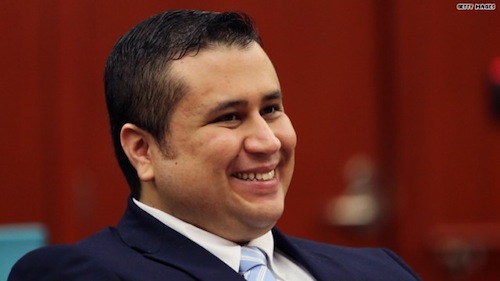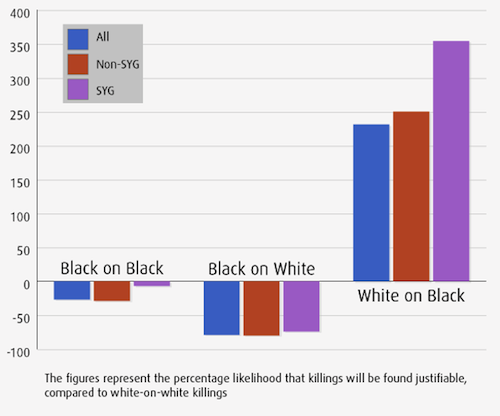Perhaps you heard already, but George Zimmerman acted in self-defense when he used his gun to kill the unarmed 17 year-old he followed down the street. Contrary to popular perception, Zimmerman’s defense team did not rely on Florida’s Stand Your Ground law, which A) allows people to use deadly force when they consider themselves at risk of death or great bodily injury, and B) does not require them to retreat from such threats, even when they might reasonably be able to do so. While most states have adopted the so-called Castle Doctrine, which applies to homes, Florida and several others have extended to any lawfully occupied public place the right to use deadly force rather than retreat. Since they did, they have experienced an average 8% increase in homicides and non-negligent manslaughter.
It’s almost as if expanding the range of situations in which it is legal to kill another person encourages more people to try it. Bear in mind that the 8% increase came after state law redefined certain situations that used to be homicide or manslaughter as legal self-defense, meaning that murder went up even after more kinds of killing were classified as not murder. One presumes that general killing went up even more.
One does not know, however, because either statistics do not exist or one is too stupid/lazy to dig them up. Statistics totally exist to support another claim relative to the innocence of George Zimmerman, though: white people who kill black people and claim self-defense are far more likely to be found innocent than black people who make the same claim about killing whites. Props to Ben al-Fowlkes for the link. If you hate links, you can see the broad results of regression analysis below:
Even in a state without a Stand Your Ground law, courts are 250% more likely to accept your self-defense claim if you are white and kill a black person. If you are in an SYG state, though, your odds of successfully claiming that you killed a black person in self-defense shoot up to more than 350% better than if you shot another white person. It doesn’t work if you’re black. In all states, if you kill someone and are black, you are less likely to successfully plead self-defense than defendants in white-on-white crimes.
But what does it mean? You can’t use statistics to prove racial bias in law enforcement, because what if black people are simply more likely to have really done it? In McCleskey v. Kemp, the Supreme Court ruled that a defendant cannot use evidence of systemic discrimination to prove his particular death sentence unconstitutional. Broad statistical evidence doesn’t weigh on individual cases. That’s why it would have been wrong for Zimmerman to identify Trayvon Martin as a person he could kill with impunity, even though conviction data suggests such an assumption was 350% more likely to be true than if Martin were white.
So before we get all up in arms about this Zimmerman-is-innocent thing, let’s imagine how the trial would have played out if a 200-pound black man shot and killed a white teenager in a toney Florida suburb. Nine times out of ten six times out of 100, the result is exactly the same.
We can’t say Zimmerman was found innocent because he identified as white and killed a black person. His successful self-defense claim contributes to the statistics, but the statistics do not dictate the success of his self-defense claim. By the same token, we can’t say that Zimmerman, while voluntarily patrolling his neighborhood, got out of his car and followed the unarmed person he eventually shot in self-defense because that person was black. His decision contributes to the long statistical history of racial bias in America, but that bias does not dictate the contents of Zimmerman’s heart.
“Punks,” Zimmerman said to the police dispatcher before he started following Martin. “They always get away.” That’s the kind of specious application of broad trends to individual cases that we should be careful to avoid, here. You can’t take what you think you know about things generally and impose it on whatever specific situation is in front of you. George Zimmerman did that, and look how much trouble he got into. None at all, really—so I guess you can’t do that unless you’re white.






What a fucking horrible chart! Didn’t the Supreme Court decree that racism was over last week?
Sample size alert – from the comments in the original article, and I believe it’s relevant to your discussion
“Additionally, there are far fewer white-on-black shootings in the FBI data — only 25 total in both the Stand Your Ground and non-Stand Your Ground states.”
Also, it would be more correct to have a half-white/half-Hispanic chart…
While there might be a number of interpretational problems with this study, I don’t get the “it’s a small sample size” one. Regression analysis takes into account sample size when it calculates the significance level. Leave it alone, it’s been tested! No double jeopardy for sample size!
Keywords are guilty beyond a shadow of a doubt, and I’m thankful it is so. There was no case with any strength to convict Zimmerman. If we didn’t have those keywords and if Zimmerman is telling the truth he’d be screwed, and so would many other innocents. Perhaps Zimmerman did maliciously kill Trayvon, and he got lucky that there was no witness or evidence to prove otherwise, but probably Trayvon was assaulting him and being a hotheaded coward Zimmerman shot off his gun.
The study is weak for more reasons than sample size. It tells no circumstances of the extra deaths, nor any mention of previous death rates, it is observational by necessity, just like most other social research, and therefore can make no predictions nor account for confounding factors.
The legal standard is “beyond a REASONABLE doubt”.
“it is observational… therefore it can make no predictions.”
Do you ever check the Weather Channel before you go out?
Observation is obviously a key part of making predictions, but what I was clearly referring to is that this study is an “observational study”, meaning not a randomized controlled experiment. The researcher did not randomize the states into a ‘stand your ground’ group versus a ‘no stand your ground’ group. The circumstances in the states made them that way, and it is impossible to say if those circumstances confounded the results of the study. correlation is not casusation.. blah… blah… blah.
Ok, the standard is reasonable doubt, not beyond the shadow of a doubt. The evidence was not there to pass even this more relaxed standard.
No, what you clearly stated was that this was an observational study and “therefore can make no predictions nor account for confounding factors.” Weather prediction is based on observational data, not randomized controlled studies on other planets like Earth. So it is incorrect to dismiss a study as incapable of prediction on the basis of it being observational.
It is also not true that observational studies cannot “account for confounding factors,” if I understand your awkward phrasing of that correctly. Observational studies can statistically control for confounding factors. That is what a regression analysis does. It is not “impossible” to say if other circumstances in the states are responsible for the differences. You could consider doing what ever other social science researcher does: make a hypothesis about your preferred explanatory variable and test it. Unless what you are saying is some version of “We never now for sure!” in which case it has nothing whatsoever to do with this study being observational. I could claim that it is “impossible” to know for sure about any randomized controlled experiment, because MAYBE an angel swooped in and cast a magic spell.
Experimental designs ARE usually better (not always) but experimental designs are also rife with confounding factors. I am sorry to break this ghastly news to you.
As I said originally, the study may have a number of interpretive problems. It was clearly done off the cuff, so I imagine there is a more formal analysis in the works. It won’t be definitive, but I would much rather have this data and analysis than listen to a bunch of white dudes talk about how they have never noticed any institutional racism in their everyday lives.
Trying to dismiss a study on the basis of it being an “observational” is ridiculous. Much of our lives, health care, policies, etc are based on “observational” studies. Get over it.
Leif –
I like how you first referred to the Weather Channel to support your observational study comment. That is what I would have used too. They are always correct…
And then I liked how you showed your supriority to Captain and your awesome command of the english language – “if I understand your awkward phrasing of that correctly.” In your words – its a blog. “Get over it.”